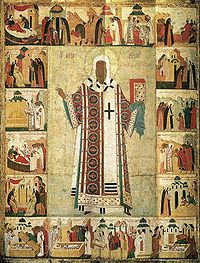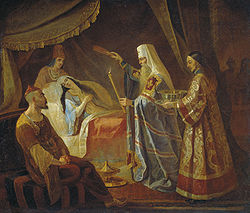- Alexius, Metropolitan of Moscow
-
Saint Alexius,
Metropolitan of Moscow
Icon of St. Alexis with scenes from his life by DionisiusWonderworker Born ~1296
MoscowDied 1378 Honored in Eastern Orthodox Church Canonized 1448 Major shrine Chudov Monastery Feast February 12 Attributes Vested wearing bishop's omophorion and patriarch's koukoulion. Sometimes holding a Gospel Book with his right hand raised in blessing Patronage Moscow Saint Alexius (Алексей or Aleksij in Russian) (before 1296 – 1378)[1] was Metropolitan of Kiev and all Russia (since 1354), and presided over the Moscow government during Dmitrii Donskoi's minority.
Alexius, whose name at birth was Elephtherios, was a son of Fyodor (Theodore) Biakont, a boyar from Chernigov who settled in Moscow and founded the great Pleshcheev boyar family. He took monastic vows at the Epiphany Monastery of Moscow around 1313, at which time he was given the religious name of Alexius. In 1333 or so, he joined the household of Metropolitan Theognostus. In 1340, Alexius was appointed the Metropolitan's deputy in Vladimir and twelve years later was consecrated as Bishop of Vladimir.
By the will of Symeon the Proud, Alexius was appointed adviser to his brothers - Ivan and Andrew. After visiting Constantinople, he was chosen to become the Metropolitan of Moscow and all Russia in 1354. When Dmitrii Donskoi and Vladimir the Bold were young, Alexius was their spiritual tutor and served as regent at the same time. He took the side of Dmitrii Donskoi in his struggle against Tver and Nizhny Novgorod, where he once sent St. Sergius of Radonezh to suspend divine service in churches and monasteries, until the political strife was over.
In 1357, Alexius was summoned by Jani Beg, the Khan of the Golden Horde, to cure his wife from blindness. The metropolitan's success is held to have prevented a Tatar raid on Moscow.
In 1360s, Alexius founded the Andronikov, Chudov, and Alekseyevsky monasteries. He promoted Metropolitan Peter's canonization by the Russian Orthodox Church. Shortly before his death, Alexius fruitlessly tried to convince Sergius of Radonezh to become his successor.
Alexius was also an author of a number of sermons and epistles. He was glorified (canonized) by the Russian Orthodox Church in 1448 and has been revered as one of the patron saints of Moscow. His relics were venerated in the Chudov Monastery that he had founded.
Feast Days
February 12 (the day of his repose), May 20 (the day of the uncovering of his relics) and October 5 (Synaxis of the Hierarchs of Moscow).[2]
References
- ^ André Vauchez; Richard Barrie Dobson; Adrian Walford; Michael Lapidge (2000). Encyclopedia of the Middle Ages. Editions du Cerf. p. 39. ISBN 9781579582821. http://books.google.com/books?id=qtgotOF0MKQC&pg=PA39. Retrieved 20 October 2010.
- ^ Orthodox Church of America, Feasts and Saints
External links
Orthodox Church titles Preceded by
TheognostusMetropolitan of Moscow Succeeded by
CyprianCategories:- 13th-century births
- 1296 births
- 1378 deaths
- Eastern Orthodox saints
- Metropolitans and Patriarchs of Moscow
- Russian saints
- Wonderworkers
- 13th-century Christian saints
Wikimedia Foundation. 2010.

